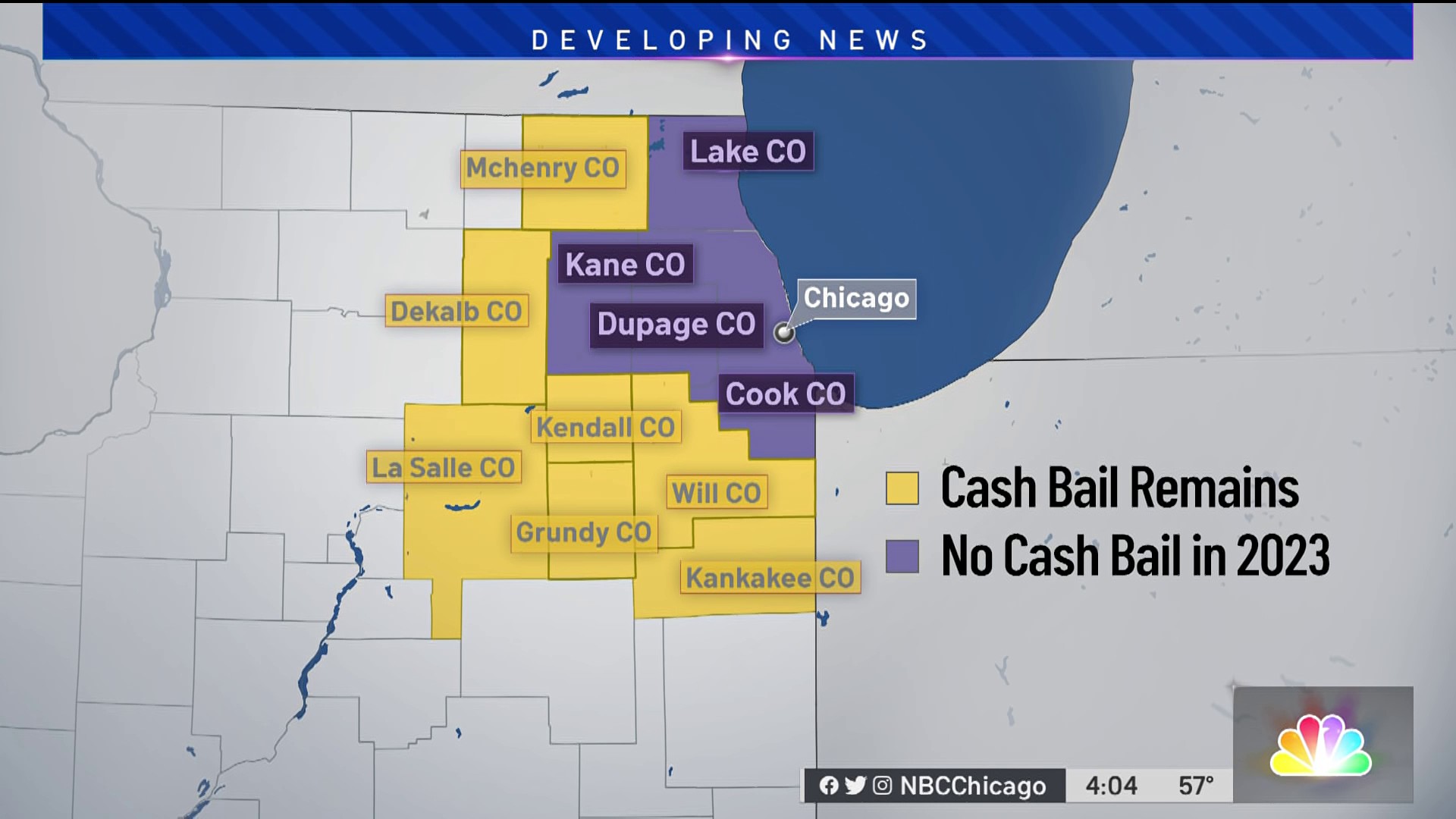The end of cash bail was set to begin on Jan. 1, but in a last-minute order, the Illinois Supreme Court halted the measure just hours before it was set to take effect in Illinois. So what happens now?
The Supreme Court's decision came as prepares to examine pretrial release provisions under the controversial SAFE-T Act, which was recently amended and signed into law by Gov. J.B. Pritzker.
The Pretrial Fairness Act, the portion of the SAFE-T Act which eliminates cash bail, was deemed unconstitutional last week by a Kankakee County judge following a class-action lawsuit from several jurisdictions in the state. The judge's decision meant that cash bail would remain in place across 65 counties in the state, leading to questions as the Illinois Attorney General's Office filed an appeal of the ruling.
State's attorneys in Kane and DuPage counties requested the Illinois Supreme Court delay the elimination of cash bail amid confusion over how a divided state would work.
"Had the SAFE-T Act gone into effect on January 1, 2023, while litigation is pending, the administration of justice in Illinois would have been uneven, thus harming all the citizens of the State. Additionally, DuPage and Kane Counties, would have faced additional challenges as multiple municipalities are in multiple counties, some of which were bound by the pending litigation and others that were not," DuPage County State’s Attorney Robert Berlin and Kane County State’s Attorney Jamie Mosser said in a joint statement.
The state's Supreme Court court issued an order Saturday evening suspending the implementation of the Pretrial Fairness Act until further notice "in order to maintain consistent pretrial procedures throughout Illinois."
So what happens now?
Here's a look at what we know so far:
What happens next?
The Illinois Supreme Court said it planned an “expedited process” for the appeal.
Feeling out of the loop? We'll catch you up on the Chicago news you need to know. Sign up for the weekly> Chicago Catch-Up newsletter.
Outside of the elimination of cash bail, other portions of the SAFE-T Act, including new requirements for body cameras and other police reforms, were allowed to stand.
“It is important to note that the order issued today by the court is not a decision on the merits of the constitutionality of the SAFE-T Act, and I appreciate the court’s interest in expediting the appeal," Illinois Attorney General Kwame Raoul said in a statement. "We look forward to mounting a robust defense of the constitutionality of the law and ensuring that it goes into effect across the state.”
Pritzker has said he is confident the act will be found to be constitutional by the justices.
What is the SAFE-T Act?
Emerging after the Minneapolis police beating death of George Floyd in May 2020, the SAFE-T Act sets rigorous new training standards for law enforcement, spells out rules for police use of force in immobilizing troublesome suspects, requires body cameras on all police by 2025 and more.
Authored by the Illinois Legislative Black Caucus, the act was approved by the Illinois General Assembly last year, bringing "significant changes" to things like police training policies, police accountability, transparency in law enforcement and the rights of detainees and prisoners, according to Sen. Elgie R. Sims, Jr., who sponsored the bill.
Among the changes it is set to bring are the elimination of monetary bail, a requirement that all police officers wear body cameras by 2025, a ban on all police chokeholds, new guidelines for "decertification" of police officers, and an end to suspended licenses for failure to pay, among several other things. It also bans police departments from purchasing military equipment like .50 caliber rifles and tanks, increases protection for whistleblowers, and adds to rights for detainees to make phone calls and access their personal contacts before police questioning.
Detainees, prisoners and all those who interact with police officers would have the expectation of prompt medical care while in custody, with special accommodations made for pregnant women. Charges of resisting arrest must cite a justification for the original arrest that was allegedly resisted against under the measure, as well.
For a complete list of what was included in the original SAFE-T Act click here.
Why did the judge rule eliminating cash bail was unconstitutional?
Kankakee County Circuit Judge Thomas Cunnington's ruling held that the pretrial release provisions in the SAFE-T Act violated the Separation of Powers Clause, the Victim Rights Act, and unconstitutionally amended Article I, Section 9 of Illinois' constitution, which codified cash bail in the state.
Cunnington was swayed by the plaintiffs' argument that the state constitution provides for bail in stating, “All persons shall be bailable by sufficient sureties,” while Illinois Attorney General Kwame Raoul's staff contended that the statement merely assures defendants that there's a way out pending trial.
The state appealed that decision.



